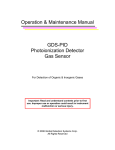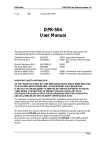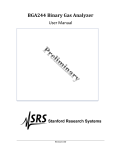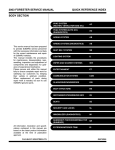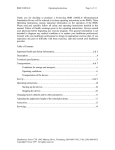Download Crowcon F-Gas Detector
Transcript
Crowcon F-Gas Detector Infra-Red SF6 and Refrigerant Gas Detector Installation, Operating and Maintenance Instructions M070029 Issue 1 January 2014 F-Gas Detector Instructions Table of contents 1. General.......................................................................................................................... 3 2. Installation...................................................................................................................... 4 3. 4. 2.1. Operating voltage and analogue outputs (general) ................................................. 4 2.2. Installation .............................................................................................................. 5 2.3. Compensation of the ambient pressure................................................................... 7 Start-up.......................................................................................................................... 7 3.1. Wiring instructions................................................................................................... 7 3.2. Analogue output: (0)4-20mA ................................................................................... 8 3.3. Use of the voltage output ........................................................................................ 9 3.4. Wire breaks........................................................................................................... 10 Operating the transmitter using the key-pad................................................................. 11 4.1. Start-up phase ...................................................................................................... 11 4.2. Regular operation ................................................................................................. 12 4.3. Malfunction ........................................................................................................... 12 4.4. Device error / Hardware error ............................................................................... 12 4.5. Maintenance ......................................................................................................... 12 4.6. Exiting maintenance mode without accepting any changes................................... 12 4.7. Exiting maintenance mode, taking over changes .................................................. 13 4.8. Restoring factory settings...................................................................................... 13 4.9. ZERO calibration .................................................................................................. 13 4.10. SPAN-calibration ............................................................................................... 14 4.11. Information sheet, process of operation and displays ........................................ 16 5. Specifications............................................................................................................... 17 6. Product options............................................................................................................ 18 7. Warranty ...................................................................................................................... 19 The equipment described in this manual is designed for the detection of toxic gases. Ensure local safety procedures are adopted before carrying out any maintenance or calibration work. The equipment described in this manual may be connected to remote alarms and/or shutdown systems. Ensure that local operating procedures are adopted before carrying out any maintenance or calibration work. F-Gas Gas Detector Instructions 1. General The F-Gas detector provides the benefits of the IR gas sensor technology within a robust enclosure. Rear Casing Interface PCB Front Casing Figure 1: F-Gas Detector Layout The sturdy, IP54-protected protected casing houses the IR sensor, a user interface with LED status indication and the interface electronics (fig.1). Based on the physical measuring principle of infrared absorption, apart from selectiveness, this transmitter offers the best prerequisites for reliable and lasting detection detection, even in a difficult environment. The F-Gas detector is able to detect even the smallest quantities of toxic gases reliably and to report its findings to a connected control system. The gas concentration can be transmitted as a linear analogue current or voltage output. The following signals are available as analogue values: (0)4 – 20mA Linear; the desired operating mode can be set via a link 0 - 2V Linear; the desired operating mode can be set via a link 0 - 5V Linear; the desired operating mode can be set via a link 0 - 10V 10V setting requires at least 15V DC as supply voltage Important: the F-Gas Gas detector is not certified for use in a hazardous area. Any form of maintenance, parameterization and all changes to the settings of the device must only be carried out by trained and authorized staff. F-Gas Detector Instructions Never attempt to dismantle this device by yourself in order to tamper with its hardware or to alter its software. Any mechanical damage, such as opening of glued pipe connections or gaskets or the loosening of screws will result in the termination of all liability and warranty granted by Crowcon Detection Instruments Ltd. 2. Installation 2.1. Operating voltage and analogue outputs (general) The F-Gas detector is designed to operate in a range of an input voltage of 12 to 2 28Vdc. A faultless operation is guaranteed within these parameters. Supply voltage fluctuations must be kept as small as possible. All connections used for supply and output signals are available from connector ST1 (fig. 2) and can be accessed by opening the transmitter casing – see fig. 2. Connector ST1 V+ I GND RS+ RS- Figure 2: Opened transmitter casing with interface electronics V+ I Connection of the supply voltage 12 to 28Vdc. Analogue output signal (optionally 0-20mA; 4- 20mA or 0 to 2/5/10V). GND 0V (common ground for V+, I and RS485 (not yet implemented) implemented)). RS+ Non inverted signal line for the integrated RS485 interface (not yet implemented) RS RS- Inverted signal line for the integrated RS485 interface (not yet implemented) Figure 3: connector ST1 – connection for power supply, analogue output and the RS485 interface F-Gas Gas Detector Instructions The connection of the internal IR sensor module to the interface electronics is via a 4 4-pin data cable (Fig. 4). The he circuit board is screwed to the internal built-in built in casing from the outside. The IR gas sensor is integrated into this casing to minimize the dead volume and to protect it from any unwanted external effects. Figure 4: 4-pin pin data cable connecting the IR sensor to the interface PCB Caution: The IR sensor module is tailored to the connected interface PCB and must only be operated as a pair.. Both components form a fixed unit and must not be separated! 2.2. Installation The installation of the transmitter is described as follows. The F-Gas Gas detector should be mounted where the gas to be detected is most likely to be present. The gas must come into direct contact with the sensor in order to be detected. Detectors are typically ypically installed around compressors, pressurised storage vessels, refrigerant cylinders, within storage rooms or adjacent to pipelines. Gas leaks typically occur from valves, pipe flanges and joints, pipe/vessel filling or draining connections, etc. The following points should be noted when locating gas detectors: • To detect heavier-than-air air gases detectors should be mounted at low level. • Detectors must be mounted as close as possible to potential leak sources. • When locating detectors consider the possible damage caused by water: rain, flooding, or exposure to jets from hoses or pressure washers. • Consider ease of access for functional testing and servicing. • Consider how the escaping gas may behave due to natural or forced air currents. • Consider the process conditions. For example heavier than air gases may rise if released from a process at elevated temperatures and/or pressures. F-Gas Detector Instructions The placement of sensors should be determined following advice of experts having specialist knowledge of gas dispersion and the plant processing equipment as well as safety and engineering issues. The agreement reached on the locations of sensors should be recorded. Gently prize-open the flaps using a screw driver being careful to not damage the flaps (see fig. 5): Figure 5: Opening flaps to get access to the internal parts of the transmitter Remove the front casing (fig. 6) Figure 6: front casing removed F-Gas Detector Instructions Mount device vertically to the wall using the 4 screw holes (fig. 7) with the cable gland pointing downwards. Figure 7: mounting holes Mounting hole spacing: 127.5mm x 62.5mm. Mounting hole diameter: 4mm. Warning: never install the detector with the front panel facing upwards. Doing so may lead to the IR sensor filter becoming blocked by dust/contaminants which could prevent gas from reaching the sensor. 2.3. Compensation of the ambient pressure In order for the transmitter to be as flexible as possible and to facilitate the use both at sea level and in higher regions, the so-called real gas formula must be taken into account. As a result of the physical properties of gases, the density will change, depending on the relevant altitude and, due to this fact; the absorption of the IR radiation inside the measuring cell will change accordingly. Without any pressure compensation, it would lead to inaccuracies in the measurement of the concentration and possibly to faulty data. As the ambient pressure must be taken into account when measuring the concentration in diffusion mode, a pressure sensor is already integrated firmly in the transmitter. For this reason no setting or parameterization by the user is required. 3. Start-up 3.1. Wiring instructions Electrical connections are made via the connector ST1 - see Figure 2. In order to avoid any errors and damage, the system must be mounted while the power has been switched off. It is imperative that the following order is observed: 1. Switch off the power. 2. Mount the transmitter in the desired position. While doing this, adequate distance to live parts must remain in order to avoid short circuits and damage. 3. The installation in the vicinity of ventilators, windows, ventilation shafts and similar facilities must be avoided. Any air flow or drought near the transmitter may lead to inaccurate readings and false alarms or inadequate function. F-Gas Detector Instructions 4. Connect a 3-core core cable from the control system to the appropriate V+ (12-28Vdc) , I (analogue logue signal) and GND (0V) terminals. The cross section of the cables used should not exceed 1.5mm². A compression type cable gland is fitted suitable for cable with a maximum diameter of 5mm. Crowcon strongly recomends installation using screened cables to avoid signal interference. 3.2. Analogue output: (0)4-20mA (0)4 The analogue output of the transmitter offers offer two options for reading out the measuring data: 1. Current signal in the region of 0-20mA, 0 20mA, linear to the measuring value; 2. Current signal in the region of 4-20mA, 20mA, linear to the measuring value. (This option also facilitates the easy detection of a broken wire or the failure of the sensor) (Alternatively, Alternatively, the analogue output can be set as a voltage signal using links JP4, JP5, JP6. More information regarding this can be found in sub-section sub 3.3) The mode of the current signal can be selected using the jumper JP3: 1. Not connected 0-20mA (factory settings) 2. Connected 4-20mA Figure 8: Link JP3 for selection of current mode (4 (420mA setting is shown) Link JP3 Caution: switching between current modes with the link must only be carried out when the power is turned off (disconnect supply voltage). For the purpose of the analogue signal 0-20mA 0 or 4-20mA, 20mA, the transmitter can be regarded as a Current Source transmitter. The F-Gas Gas detector can be connected directly to a suitable control system taking care to connect the V+, I and GND terminals to the ap appropriate connections on the controller. Once the power supply has been connected, the transmitter becomes active and is running (see chapter 5). F-Gas Gas Detector Instructions The analog current output is able to indicate several different conditions. This complies with the NAMUR NE43 standards: 0 to 2.8mA Fault 3.2 to 3.6mA Under-range range 3.6 to 3.9mA Under-run run detection range 4 to 20mA Detection range 20 to 21mA Over-run run detection range 21 to 21.5mA Over-range range >21.5mA Fault 3.3. Use of the voltage output In some applications it is necessary to read the output signals of the transmitter as a linear voltage signal. For this purpose, the relevant link (JP4-6) 6) has to be connected (Figure 9). Figure 9: Link JP4-6 for selection of output voltage (10V DC setting is shown shown) Depending on the selected operating mode, the following modes can be set: 0-20mA JP3 not connected 4-20mA JP3 connected Only one of the following jumpers must be connected at any given time! 0..2V JP4 0..5V JP5 connected F-Gas Detector Instructions 0..10V JP6 connected (15V DC supply voltage required) When using the above mentioned configuration, the following voltage values can be connected at the output: 2V (JP4) 5V (JP5) 10V (JP6) 0-20mA (JP3 not connected) 0V – 2V 0V – 5V 0V – 10V 4-20mA (JP3 connected) 0.4 V – 2V 1.0V – 5V 2.0V – 10V Other link functions: JP1: reserved for future use (RS-485 termination) JP2: factory use only. 3.4. Wire breaks Should the communication between the IR sensor and the interface electronics be disrupted during the operation of the transmitter, (unintentional disconnection or wire break), this status will be displayed at the power output as follows: Operation with 4-20mA Operation with 0-20mA Output current will be frozen at 2mA. the current value last issued will be frozen. Depending on the operating mode and the subsequent evaluation, aforesaid status can be used for error detection. If the fault is repaired, the transmitter will restart automatically with the regular startup phase, then resume regular operation. Note: If the operating mode 0-20mA was selected, the frozen current value will be maintained until the completion of the new start-up phase. In general, the reliable detection of a wire break is only possible in operating modes 420mA! F-Gas Detector Instructions 4. Operating the transmitter using the key-pad The control panel (figure 10) of the transmitter is integrated in the front cover. This is required if zero or span calibration has to be carried out. The following operating and display functions are available: Display elements: STATUS STATUS-LED 3-colours (red, yellow, green) SPAN-LED LED yellow ZERO-LED LED yellow SPAN Operating elements: UP SPAN ZERO DOWN button button button button ZERO Figure 10: Display key-pad The transmitter can be calibrated and several settings can be made using the display keypad. 3-colour STATUS-LED indicates the current operating status. Only one of the three colours is active at any given time. In addition to this, the conditions “off“, ”on“ and ”flashing“ exist. The SPAN and ZERO LEDs have a special purpose. At any given time, only one of these two LEDs can be active. The three conditions “off“, ”on“ and ”flashing“ exist here as well. 4.1. Start-up phase After the power supply and the selected interfaces have been connected, the transmitter will begin the start-up phase (STATUS-LED will flash green). This will take less than 2 minutes and this time is used to check all internal components. During the start-up phase, the analogue value issued shows the minimum value; the concentration shows ”0“. Depending on the operating mode selected, the following conditions can occur during the start-up phase: In 0-20mA mode Output current 0mA. After approx. 2 minutes depending on the pending gas concentration. During the warm-up period, the sensor signal may still deviate slightly from the exact concentration. In 4-20mA mode Output current approx. 2mA, then a jump to approx. 4mA. After about sensor signal may show values of less than 4mA as it can still deviate slightly from the exact concentration during the warm-up period. Once the start-up phase is completed and all the test routines have been carried out with positive results, the transmitter will change to its regular mode, making the measured gas concentration available via the interfaces. In case a fault was detected during the start-up phase, the transmitter will change to the operating mode “faulty” (see 4.3). F-Gas Detector Instructions 4.2. Regular operation During regular operation, the STATUS-LED will show green throughout. The system is operating faultlessly within its measuring parameters. The gas concentration values will be indicated by the interface signal. 4.3. Malfunction Malfunction (STATUS-LED will flash red) is active if the concentration level is above or below the defined limits to a degree that a violation of the measurement range has to be considered. This device status is reversible. Once the concentration is back to its defined range, the STATUS-LED will automatically change to green light (see “regular operation”). 4.4. Device error / Hardware error A device or hardware error (STATUS-LED lights up red without flashing) indicates irreversible damage, which always requires a device service as in most cases the change or repair of a component is necessary. If still possible, an analogue value will be set, which indicates a fault 4.5. Maintenance Crowcon recommends the detector is zeroed and tested with gas every 12 months as a minimum. The sensor may be zeroed in clean air, and the target gas must be applied at a known concentration to verify correct sensor response. Calibration gas should be applied using the Calibration Adaptor accessory (part number: C03658) at a flow-rate of 0.5 litres per minute. If internal settings are to be changed (e.g. calibration, parameters, factory settings, addresses, access codes ) the system has to be switched to maintenance mode. A ZERO or SPAN calibration for example is only possible after the maintenance mode has been activated. In case of a device error, the system cannot change to maintenance mode. In order to get to maintenance mode, a pre-defined access code (factory settings: UP, UP, SPAN, ZERO, DOWN, DOWN) must be entered faultlessly within 6 seconds. Such an access code always consists of exactly 6 keystrokes, which must be entered one after the other within 6 seconds. If the access code is correct, the system will change to the first level of the maintenance mode (STATUS-LED will light up yellow). If the access code is incorrect or not entered fast enough, the STATUS-LED will signalize an error by flashing red for the second. In this case, the maintenance mode will not be activated (the transmitter ill remain in regular or faulty mode). 4.6. Exiting maintenance mode without accepting any changes If the maintenance mode should be exited without taking over any possibly carried out changes, the button UP must be pressed for 3 seconds. F-Gas Detector Instructions The STATUS-LED will then change to signalization, flashing red for 3 seconds and the change to “Regular operation” mode indicated by the STATUS-LED light up green. Generally, maintenance mode will also be exited without taking over any changes if the user has not made any entries for 30 minutes. Caution: Maintenance mode can only be exited from level 1. An indication for level 1 is the STATUS LED lighting up yellow (refer to diagram in section 4.11). 4.7. Exiting maintenance mode, taking over changes If maintenance mode should be exited, taking over all changes, the button DOWN should be pressed for 3 seconds. DOWN to be pressed for 3 seconds. The STATUS-LED will then change to flashing green to signalize this and after that change to “Regular operation” mode with the STATUS-LED light up green. Caution: maintenance mode can only be exited from level 1. An indicator for level 1 is that the STATUS-LED lights up yellow (refer to diagram in section 4.11). 4.8. Restoring factory settings This function deletes any previously made changes carried out by the user and restores the factory settings of the transmitter. The module addresses, as well as the calibrated values are not affected by this. Press DOWN 6 times in a row for 6 seconds without any errors. If the restoration has been completed successfully, the STATUS-LED will flash green for 3 seconds, then changing to lighting up yellow (one is still in level 1 of maintenance mode) one is still able to carry out more system changes. If an error is detected in the entering of the data, the STATUS-LED will flash red for 3 seconds, then changing to light up yellow (one is still in level 1 of maintenance mode). The factory settings have not been restored. The process has to be repeated. Caution: The changes only become effective when the maintenance mode has been exited as described in chapter 5.1.7. Without this process, for instance when severing the operating voltage, all changes will be lost. 4.9. ZERO calibration ZERO-calibration can only be carried out from level 1 of the maintenance mode being a selfcontained process (refer to diagram in section 4.11). For this reason, any new data collected from the ZERO-calibration must be taken over or deleted explicitly when exiting the entire maintenance mode (see Chapter 4.7). The self-contained part of the ZERO-calibration is similar to a second level in the maintenance mode. The ZERO-calibration mode can be activated by pressing the button ZERO for 3 seconds. If the entry was correct, the STATUS-LED will change from lighting up yellow to flashing yellow. In addition to this, the ZERO-LED will flash yellow. F-Gas Detector Instructions Keep the ZERO pressed for 3 seconds. Now, the user must apply the correct sample gas for the ZERO-calibration using the available calibration adapter (typically air or nitrogen. In case of doubt, please contact the supplier). If a stable value is found within a time window (60 seconds) regarding the concentration and this value is found in a plausible value range, the ZERO-LED will change from flashing yellow to steady yellow. Now, the user is able to set the desired concentration value of the output signal by using the UP and DOWN keys. For this, the relevant set value can be monitored live at the analogue output. Pressing the UP or DOWN keys for longer will lead to an auto-repeat. This feature is helpful for the adjustment for a larger range. Exiting the ZERO-calibration can be carried out any time by pressing ZERO for 3 seconds. Keep ZERO pressed for 3 seconds. If the action was successful, the STATUS-LED will change from flashing yellow to flashing green for 3 seconds, subsequently changing to lighting up yellow (one is still in level 1 of maintenance mode and is still able to carry out system change In the case of an error in connection with the ZERO-calibration, the STATUS-LED will change from flashing yellow to flashing red for 3 seconds, subsequently changing to a steady yellow (one is still in level 1 of maintenance mode). The changed calibration values were not taken over. This process has to be repeated. Caution: The changes only become effective when the maintenance mode has been exited as described in chapter 4.7. Without this process, for instance when severing the operating voltage, all changes will be lost. 4.10. SPAN-calibration The SPAN-calibration is only possible from level 1 of maintenance mode (refer to diagram in section 4.11); this is a self-contained process. Thus, even new data, which have been gained from SPAN-calibration must be taken over or deleted explicitly when exiting the entire maintenance mode (see Chapter 4.7). The self-contained part of the SPAN-calibration can be regarded as a second level of maintenance mode. The SPAN-calibration level can be activated for 3 seconds by typing SPAN for 3 seconds. If the entry was successful, the STATUS-LED will change from a steady yellow to flashing yellow. In addition to this, the SPAN-LED will flash yellow. Keep SPAN pressed for 3 seconds. Now, the user must supply the correct sample gas for the SPAN-calibration with the help of the calibration adapter, which is available as accessory. If a stable value is found within a time window (60 seconds) regarding the concentration and this value is found in a plausible value range, the SPAN-LED will change from flashing yellow to steady yellow within a time window of 60 seconds. If the concentration found continues to be stable, the SPAN-LED will change from flashing yellow to steady yellow. F-Gas Detector Instructions Now, the user is able to set the desired concentration value of the output signal by using the UP and DOWN keys. For this, the relevant set value can be monitored live at the analogue output. Pressing the UP or DOWN keys for longer will lead to an auto-repeat. This feature is helpful for the adjustment for a larger range. It is possible to exit the SPAN-calibration at any time by pressing SPAN for 3 seconds. Keep SPAN pressed for 3 seconds. If the action was successful, the STATUS-LED will change from flashing yellow to flashing green for 3 seconds, subsequently changing to lighting up yellow (one is still in level 1 of maintenance mode and is still able to carry out system changes. In the case of an error in connection with the SPAN-calibration, the STATUS-LED will change from flashing yellow to flashing red for 3 seconds, subsequently changing to a steady yellow (one is still in level 1 of maintenance mode). The changed calibration values were not taken over. This process has to be repeated. Caution: The changes only become effective when the maintenance mode has been exited as described in chapter 4.7. Without this process, for instance when severing the operating voltage, all changes will be lost. F-Gas Detector Instructions 4.11. Information sheet, process of operation and displays Power ON STAT STAT Measur e: SPAN Out of Range St ar t up: Sensor SPAN scan Sensor found ZERO ZERO SPAN ZERO 3 s lat er no key for 3 0 min STAT Measur e: Sensor SPAN okay STAT Sensor br oken Out of r ange Sensor okay ZERO Failur e: Sensor br oken STAT 3s lat er PIN er r . / t imeout STAT Exit 1 : Discar d SPAN changes Exit 1 : Apply all SPAN changes ZERO ZERO PIN code cor r ect UP for 3s DOWN for 3 s 6 x DOWN in 6 s: r ead fact or y default 3 s lat er STAT Ser vice: SPAN Basic Level 1 ZERO STAT 3 s lat er key er r . / t imeout STAT Exit 2 : Discar d SPAN change Exit 2 : r egist er SPAN change ZERO ZERO 6 x key in 6 s is new PIN SPAN for 3 s key er r . / t imeout 6 x UP in 6 s ZERO for 3 s STAT STAT Ser vice: SPAN SPAN scan STAT ZERO UP / DOWN: gain t une Ser vice: SPAN new PIN ZERO any key any key ZERO SPAN ZERO value st able value st able ZERO Ser vice: SPAN SPAN st able STAT Ser vice: SPAN ZERO scan STAT LED flashing: Ser vice: SPAN ZERO st able LED on: ZERO UP / DOWN: offset t une LED off: ZERO for 3 s SPAN for 3 s Maintenance mode access code (factory settings: UP, UP, SPAN, ZERO, DOWN, DOWN). Must be entered faultlessly within 6 seconds. F-Gas Detector Instructions 5. Specifications Measuring Principle: Non-dispersive infrared (NDIR) Range: 0-1000ppm Resolution: 1ppm Start-up time: <120 seconds Size: 151 x 80* x 60mm (W x H x D) *Total width with cable gland: 102mm Weight: 0.25Kg Ingress Protection: IP54 Power: 12-28Vdc Analogue Output: 4-20mA current source (can also be set to 0-20mA, 0-2V, 0-5V, 0-10V) Repeatability: +/-1% of full-scale Linearity: +/-2% of full-scale Operating Temperature: -20°C to +40°C Humidity: 0-95%RH (non-condensing Pressure: 800 – 1200mBar Response Time: 30 seconds (approximately) Approvals: EMC: EN50270 This product is designed for non-hazardous area operation only. F-Gas Detector Instructions 6. Product options The required gas calibration must be stipulated when ordering a detector. Refer to the labels fixed to the detector to determine the target gas. Pure Fluids: Fluids Formula Name Exposure Limit Detector Part Number HCFC 22 (R22) CHClF2 Chlorodifluoromethane 1000ppm (EH40, STEL) T2-700105-03002 HCFC 123 (R123) CHCl2CF3 2,2-Dichloro-1,1,1trifluoroethane 50ppm (OSHA, PEL) T2-730105-03002 HFC 125 (R125) C2HF5 Pentafluoroethane 1000ppm (OSHA, PEL) T2-720105-03001 HFC 134a (R134a) CH2FCF3 1,1,1,2Tetrafluoroethane 1000ppm (EH40, STEL) T2-710105-03003 Blended Fluids Used in Refrigeration/Air Conditioning Market: Refrigerant Composition Components Exposure Limit Detector Part Number (OSHA, PEL) R404a R407a R143a/125/134a R32/125/134a 1000ppm 1000ppm T2-740105-03001 T2-750105-03001 R407c R32/125/134a 1000ppm T2-800105-03001 R410a R32/125 1000ppm T2-760105-03001 R507 R143a/125 1000ppm T2-770105-03001 Speciality fluids: Fluid R1234yf Formula Name Exposure Limit CH2=CFCF3 2,3,3,3Tetrafluoropropene 500ppm (OSHA, PEL) Detector Part Number T2-780105-03001 Insulating Gas: Gas Name Exposure Limit (EH40) Detector Part Number SF6 Sulphur Hexaflouride 1000ppm STEL 1250ppm LTEL T2-600105-00006 Accessories: Calibration adaptor: enables test gas to be applied to the sensor. Part number: C03658. F-Gas Detector Instructions 7. Warranty This equipment leaves our works fully tested and calibrated. If within the warranty period (1 year), the equipment is proved to be defective by reason of faulty workmanship or material, we undertake at our discretion either to repair or replace it free of charge, subject to the conditions below. Warranty Procedure To facilitate efficient processing of any claim, contact our customer support team on 01235 557711 with the following information: Your contact name, phone number, fax number and email address. Description and quantity of goods being returned, including any accessories. Instrument serial number(s). Reason for return. Obtain a Returns form for identification and traceability purpose. This form may be downloaded from our website ‘crowconsupport.com’, along with a returns label, alternatively we can ‘email’ you a copy. Instruments will not be accepted for warranty without a Crowcon Returns Number (“CRN”). It is essential that the address label is securely attached to the outer packaging of the returned goods. Units returned to Crowcon as faulty and are subsequently found to be ‘fault free’ or requiring service, may be subject to a handling and carriage charge. Warranty Disclaimer The guarantee will be rendered invalid if the instrument is found to have been altered, modified, dismantled, or tampered with. Any service by 3rd parties not authorized & certified by Crowcon will invalidate the warranty on the equipment. Use of alternative manufacturer’s sensors which have not been approved by Crowcon will invalidate the warranty of the product as a whole. The warranty does not cover misuse or abuse of the unit. Sensor types have individually defined warranty periods which can differ from the hardware warranty period. Crowcon reserve the right to amend warranty periods for particular applications. Sensor warranty is rendered invalid if the sensors have been exposed to excessive concentrations of gas, extended periods of exposure to gas or have been exposed to ‘poisons’ that can damage the sensor, such as those emitted by aerosol sprays. F-Gas Detector Instructions Crowcon Regional Addresses


























